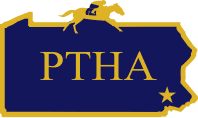Trainer Health Insurance
Pennsylvania Thoroughbred Horsemen’s Association (“PTHA”)Guidelines and Polices Regarding Insured Health Benefit Plan (“Plan”)
As amended and restated effective January 1, 2024
A. Eligibility Guidelines
The Plan is for the benefit of:
1. Employees of the PTHA after 90 days of employment, provided they work or are scheduled to work at least 30 hours per week.
2. Trainer Members of the PTHA who are in Good Standing (defined below), have at least one (1) horse stabled on the grounds of Parx Racing for at least six (6) 1-month periods (50% of the year) during the immediately preceding calendar year, and meet at least one of the following criteria during the immediately preceding calendar year:
a. Trainers with at least 25 Eligible Starts during the calendar year, provided 75% of such Trainer’s total annual starts for that year are at Parx Racing.
i. Any start not at Parx Racing during the annual Parx Racing break or any other break that may be added to the racing calendar are counted in year-end numbers and eligibility requirements. Other than as set forth in this paragraph, it is the trainer’s responsibility to reach the required percentage of their starts at Parx Racing regardless of the number of days or weeks racing occurs at Parx Racing. Notwithstanding the foregoing, starts at racetracks other than Parx Racing during any break or closure in excess of three weeks will not be included in the denominator for purposes of calculating eligibility under this section 2.a.
ii. Cancelled races at Parx Racing in which a trainer did not scratch prior to the race are counted as starts in year-end numbers and eligibility requirements.
b. Any trainer with a Full Barn for the calendar year, on both spring and fall stall applications and allotments, approved by Parx Racing Management.
c. A trainer with 125 or more Eligible Starts in the calendar year.
An “Eligible Start” shall mean a Trainer’s participation in a race held at Parx Racing where such Trainer is listed in the official results of a race as the official Trainer for a horse that ran. Trainers who meet the eligibility requirements during any year may enroll in the Plan as of the first day of the year immediately following the date all eligibility requirements are met.
3. Assistant Trainer Members of the PTHA who meet the requirements for Good Standing set forth in B.1. below and meet all of the following criteria:
a. Eligibility Requirements:
▪ Assistant trainers must have held their Pennsylvania Assistant Trainers license for a period of 12 or more months before becoming eligible and must maintain such license at all times to remain eligible.
▪ Assistant trainers must complete 1 year of employment with a licensed trainer on the Parx Racing backstretch. In the event an assistant trainer switches barns prior to completing 1 year of employment, they are ineligible.
b. Trainer Requirements for an Assistant:
• An assistant trainer must work for a trainer with 21 or more stalls (Half Barn) for the calendar year, on both spring and fall stall applications and allotments, approved by the stall superintendent.
• An assistant who works for and is licensed as an assistant to a trainer with 20 or fewer stalls may remain licensed as an assistant, but will not, under any circumstances other than as specified in this section 3b, be eligible for PTHA health insurance.
c. An assistant trainer who has met the eligibility requirements above and subsequently ceases to meet such requirements due to a change in the status of the trainer for whom they work may reestablish eligibility during the 30-day notice period of loss of coverage by becoming employed by a trainer who meets the trainer requirements in this section 3.
Assistant Trainers who meet the eligibility requirements may enroll in the Plan as of the first day of the month coincident with or next following the date all eligibility requirements are met. The Health Benefit Plan does not provide spouse or dependent coverage for assistant Trainers.
4. Household Eligibility:
If an individual trainer does not meet the requirements to be on the plan as a trainer under B.3.a., under no circumstance are they allowed to be on the plan as a spouse or dependent.
Marriage certificates will be requested by the PTHA at the time of enrollment. Failure to provide such certificate will result in a denial or loss of benefits. A trainer must notify the PTHA when a person covered as a spouse or dependent no longer qualifies as such.
5. Rules of General Applicability:
An eligible employee’s or trainer’s Spouse, and dependents under the age of 26 may also be covered under the Plan. The PTHA may require an employee or trainer to pay all or a portion of the costs for such coverage.
In any instance in which a participating trainer or assistant trainer no longer meets the eligibility requirements above, the PTHA will provide such participant with 30 days’ notice of removal from the PTHA Insured Health Benefits Plan.
Upon loss of coverage, a participant will have the option of applying for continuation coverage (COBRA equivalent) through the PTHA or the PTHA benefit trust programs.
B. Member in Good Standing
A Member will be covered only while continuing to meet the following standards.
1. An actively licensed trainer in the state of Pennsylvania, who is:
d. in good standing with the PTHA;
e. in good standing with the Pennsylvania Horse Racing Commission.
f. in good standing with HISA/HIWU and any other state or federal body with authority over thoroughbred racing in Pennsylvania; and
g. a horseman with a $0.00 balance with HPA/PTHA as of 12/31 of the current calendar year.
2. Trainer payroll records and badge lists:
a. The PTHA reserves the right to request payroll stubs of all trainer employees at any time. Failure to provide these, or providing these with inaccurate information, will lead to termination from the healthcare plan.
b. The trainer is required and expected to have updated badge lists on file with the PTHA. In the event that, upon review, these badge lists are determined by the PTHA to be incomplete, inaccurate or untruthful, the trainer’s participation in the healthcare plan will be terminated.
3. Trainer Suspensions:
a. If a trainer receives a suspension from racing of 91 calendar days or more, that trainer will receive a letter terminating their insurance effective 30 days after the ruling and start of suspension. Said trainer, along with their spouse and or dependents, will again become eligible in the next following calendar year, provided they meet all requirements.
4. If a trainer rescinds their trainers’ license, the PTHA will provide them with 30 days’ notice of removal from the PTHA Insured Health Benefits Plan. This notice will be issued when the Pennsylvania Racing Commission notifies the PTHA of such rescindment.
C. Coverage
1. Health Insurance
2. Dental
3. Vision
4. Life insurance
D. Administrative Matters
1. Funds received from the Pennsylvania Race Horse Development Fund (the “Fund”) shall be kept apart from funds acquired from other sources. Amounts received from the Fund for purposes of providing benefits to members of the PTHA, their families, and PTHA employees shall be used only for providing benefits and paying the administrative costs thereof; said funds shall not be used for the personal benefit of any officer, director, representative or fiduciary of the PTHA except as relates to any such individual’s status as a member of the PTHA who meets the eligibility requirements set forth in the above Eligibility Guidelines.
2. Administrative costs shall not be paid from the separate benefit funds to the extent such costs exceed 15% of the total statutory allocation from the Fund.
3. PTHA reserves the ability to cover Medicare-eligible members, spouses and dependents under a secondary policy and the PTHA Backstretch Benefits Program.
4. Members may be required to pay a portion of the cost of coverage for spouse and or dependents, as determined by the Board from time to time.
Rev. 2025



